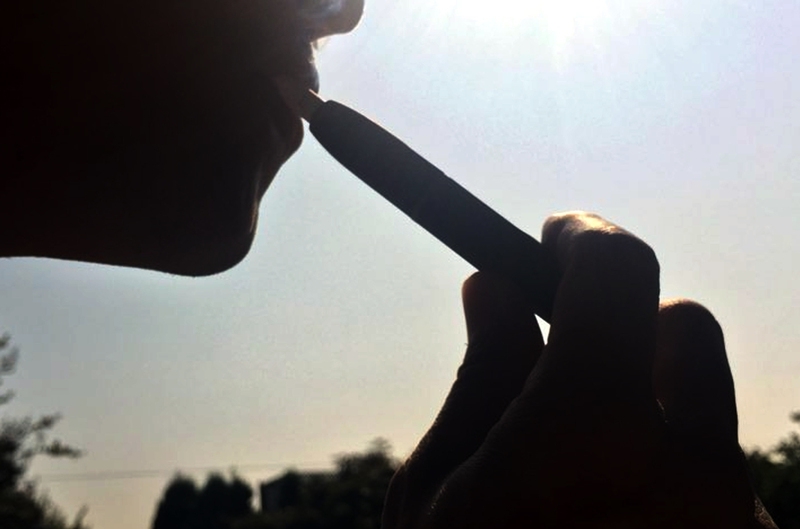
A man with a heat-not-burn tobacco device (Hankyoreh archives)
The Supreme Court ruled that electronic cigarettes constitute cigarettes and those producing them without permits should be punished as violating the Tobacco Business Act.
The Supreme Court’s second division under Hon. Justice Park Sang-ok announced on Oct. 2 that it was upholding an original ruling sentencing the Korea branch president of DYI Flavor, a 35-year-old surnamed Kim, and the president of the company’s US headquarters, a 60-year-old surnamed Shin, to two years and eighteen months in prison, respectively, in an appellate case on charges on manufacturing 667,000 e-cigarettes without permits using highly concentrated nicotine solution from overseas.
“With the amendment of the Tobacco Business Act on Jan. 21, 2014, the use of tobacco leaf materials to ‘produce [products] suitable for inhalation as vapor’ was included in the definition of ‘cigarettes,’ which resulted in e-cigarettes being included as a form of cigarette,” the Supreme Court said.
“The nicotine-containing solution used in e-cigarettes constitutes a cigarette according to the Tobacco Business Act. By adding propylene glycol, dilute vegetable glycerin, and flavoring in fixed proportion to highly concentrated nicotine solution to create a nicotine solution that could be inhaled through an electronic device, Kim et al. engaged in an act of cigarette manufacturing, which they must have a permit to do,” it added.
The Tobacco Business Act prescribes penalties of up to three years in prison or up to 30 million won (US$26,800) in fines for the manufacturing of cigarettes without a tobacco manufacturing business permit.
Kim and Shin were indicted for producing 667,754 electronic cigarettes (14.69 million milliliters) under the MAG7 and Green Leaf brands between February and December 2014 without a tobacco manufacturing permit by combining propylene glycol, vegetable glycerin, and flavoring with highly concentrated nicotine solution (1,000㎎/㎖) for packaging in 20㎖ containers. Kim was also charged with violating the Customs Act for reporting the crude nicotine solution as e-cigarette flavoring when importing 547 million won (US$488,700) worth of the solution, and was further charged with supplying 2.2 billion won (US$2.0 million) worth of e-cigarettes to e-cigarette sellers without tax invoices.
Defendants claimed they didn’t know about legal permit standards
The main issues in the trial were the question of whether e-cigarettes constituted cigarettes and the defendants’ arguments either that they did not know their e-cigarette manufacturing violated the law or that no permit standards exist for e-cigarette manufacturing in contrast with heat-not-burn tobacco.
In the defendants’ first trial, the court ruled, “To receive cigarette manufacturing permits to produce e-cigarettes, Kim et al. would have to submit a tobacco manufacturing business permit application to the Ministry of Economy and Finance [as with permits to produce heat-and-burn tobacco].”
“As they did not submit a permit application or perform any other [related] actions, it appears that they abandoned their permit application. Also, while the permit conditions are not completely stipulated in the enforcement decree, these legislative imperfections do not mean that anyone should be permitted to produce e-cigarettes,” the court concluded in handing prison sentences of two years to Kim and eighteen months to Shin.
Amendment of Tobacco Business Act in January 2014
The first trial court also noted, “Because the Tobacco Business Act was amended on Jan. 21, 2014, to include e-cigarettes as a form of cigarette, Kim et al. should have paid attention and considered whether they would be in violation of the law.”
“While the prosecutors have decided in the past not to press charges for Tobacco Business Act violations on South Korean electronic cigarettes produced with nicotine solution as in this case, all of that occurred before the amendment of the law. It cannot be a basis for [the defendants] to claim that they ‘did not know it was illegal,’” the court said.
The court in the second trial produced a similar ruling.
“Kim et al. earned billions of won in sales manufacturing and selling nicotine solution for electronic cigarettes, yet did not take adequate measures to confirm its legality. It cannot be concluded that they were unaware of being in violation of the law,” it concluded.
The Supreme Court judged both the first and second trial rulings to be without error.
“While permit standards have not yet been developed for electronic cigarette manufacturing companies, the government has discretion to make policy judgments regarding electronic cigarette manufacturing company permit standards as entrusted by the law, and permit standards exist already [to consult or apply for e-cigarette permit standards] in the case of heat-not-burn tobacco product manufacturers,” it said.
“It is impossible to concluded that it violates the principle of nulla poena sine lege to demand compliance with laws related to cigarette manufacturing businesses until such time as new permit standards are developed [for e-cigarette manufacturing],” it added.
By Yeo Hyeon-ho, senior staff writer
Please direct comments or questions to [english@hani.co.kr]




